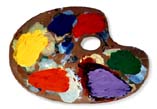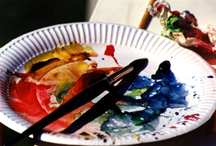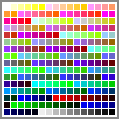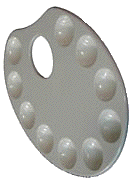


 metal,
marble, ceramic,
plastic, glass,
or paper, sometimes with a hole for the
thumb, which an artist
can hold while painting and on which
the artist mixes paint.
Anything from ice trays to disposable paper
or Styrofoam plates might
be used as a palette. A pane of glass with a white piece of paper
metal,
marble, ceramic,
plastic, glass,
or paper, sometimes with a hole for the
thumb, which an artist
can hold while painting and on which
the artist mixes paint.
Anything from ice trays to disposable paper
or Styrofoam plates might
be used as a palette. A pane of glass with a white piece of paper attached to its underside makes a fine palette. It's especially
versatile because the color of the paper back can be made to match
a painting's ground, making
colors easier to choose.
attached to its underside makes a fine palette. It's especially
versatile because the color of the paper back can be made to match
a painting's ground, making
colors easier to choose.
Clean
up of dried paints on
such a palette can be done easily with a razor knife.
with a razor knife.
The term "palette" may also refer to the range of colors used in a particular painting or by a particular artist.

In digital
imaging, "palette" might refer to a color
look-up table (CLUT), or the set of colors appearing in a
specific digital image. One such color look-up table is this 8-bit one
having 256 colors, designed for Apple's Macintosh computers.
In Egyptian art, a "palette" was slate slab, often decorated with sculpture in low relief. The largest ones were commemorative objects. Small ones, like the examples shown below, are thought to have been used for eye makeup.
(pr. pal'et)
Examples of palettes:
Egypt (Predynastic, c. 3500 BCE), Palette in the Form of a Fish, mudstone, length 9 1/4 inches, Cleveland Museum of Art. In ancient Egypt, both men and women wore eye makeup, and to manufacture it they ground up mineral pigments on a palette. Such palettes were often put into graves, perhaps to ensure that the deceased had the means to grind eye makeup in the next world. See cosmetic and kohl.
Theodore Henry Adolphus Fielding (British,
1781-1851), author; London: published for the author by Ackermann
and Co., publisher, On Painting in Oil and Water Colours, Landscape
and Portraits Including the Preparation of Colours, Vehicles,
Oils, etc., Method of Painting in Wax, or Encaustic,
1839,  printed
book; viii, 159 pages, 10 leaves
of plates: illustrations (some colored); 28 cm, Metropolitan
Museum of Art, NY.
printed
book; viii, 159 pages, 10 leaves
of plates: illustrations (some colored); 28 cm, Metropolitan
Museum of Art, NY.
Illustrated:
hand-colored frontispiece
and title page
from Fielding's treatise on painting.

Rosa Bonheur (French, 1822-1899), Palette, 19th century, oil
on wood palette, 20 3/16 x 18
1/2 inches, Minneapolis Institute of Arts. Most well known for
her realistic
paintings of animals, Bonheur painted an picture of a deer in
the center of this palette.
![]()

A molded plastic tray with 10 individual
compartments (shaped like the end of an egg) for mixing or holding
small amounts of dye or paint while working. This could be a
particularly good palette for a fabric artist.
Don't confuse the word palette
with the identically pronounced word pallet!
Also see color wheel, cool and warm colors, diffraction grating, easel, eyedropper, local color, palette, palette knife, saturation, and spectrum.
https://inform.quest/_art